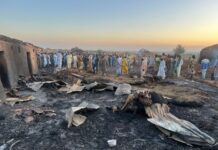Stakeholders comprising Civil Society Groups, Development Experts, Academia, Governmental and Non-governmental Actors, have identified the correction of structural imbalances embedded in socio-economic, political and ecological configuration of the North-East Nigeria as fundamental to engendering genuine and lasting development in the region. They said any effort to sustainably rebuild and develop the region must incorporate concrete mechanisms for tackling ecological issues while incorporating firm frameworks for socio-economic development and good governance principles with strong elements of citizens-focused accountability mechanisms.
The stakeholders made the points at a ‘ Dialogue on Examining Civil Societies Responses to the Humanitarian Crisis in the NorthEast’, facilitated by Social Action Nigeria in conjunction with the Youth, Adolescence, Reflection and Action Centre, YARAC with support from Development and Peace, DevP, Canada in Maiduguri, Borno State.
In his presentation at the event, the Director-General, Centre for Disaster Risk Management and Development Studies, Professor Muhammed Daura explained that the region by virtue of its geographical location was prone to varying climatic and ecological vagaries as being witnessed in the extensive draughts and desertification, sweeping floods and gully erosion etc. These he said have led to severe complications and difficulties from massive loss of land, water and bio-diversity for the inhabitants of the region where the environment he posited, was a determining factor for economic stability of families in the region.
The Disaster Risk Expert pointed out that while nature and environment have posed a significant challenge to the region on one hand, human attitude and actions on the other hand he stated have also been a major problem to the whole mix pointing out that unchecked population growth, high level of illiteracy, poverty, over-grazing, low technological adaptation and inadequate governance amongst others were key in the human-induced conditions that have given occasion to crisis in the region and said a pragmatic integrated approach was needed to solving the problems as confronting the area. Prof Daura further advocated for subsidy on Alternative energy sources adding that while steps should also be taken to improve technological adaptation and penetration in the region, provision should also be made for alternative, efficient and environmentally-friendly ‘Safe-Tree Species’ for the region.
Also speaking, Director, Ministry of Women Affairs and Social Development, Borno State, Hajia Yabuwa Kolo, lauded the intervention by Social Action and YARAC describing it as being in synergy with the goals and aspirations of her Ministry and State government towards women and children. She however bemoaned some of the challenges her ministry faced in discharging its duties explaining that a bulk of the pledges made at the Oslo conference towards the humanitarian assistance of the crisis affected people of the Northeast have not been redeemed nor reached them, putting her ministry she said, at difficulty in effectively discharging its mandate. Hajia Yabuwa added that better coping mechanism needs to be put in place for women facing the challenges of climate change while she urged the media to be more pro-active to help keep NGOs and other development workers in the area alive to their roles and responsibilities.
Other stakeholders at the dialogue made strong case for streamlining the works of the various NGOs in the regions to be more result-oriented, avoid over-arching duplicity and enhance better service delivery and accountability. Speakers also called for the incorporation and inclusion of traditional institutions by NGOs in their partnership stratagem, adding that local capacities must also be built amongst grass-root bodies and CSOs in other to reduce over-dependence on foreign aids, capacities and assistance in tackling some of the local challenges in the area.
Earlier in his welcome address, Director of the Youth, Adolescence, Reflection and Action Centre, YARAC, Prof Tor Iorapuu, explained that the Dialogue which he disclosed was one in a series, was convened to examine the response(s) by Civil Societies to the crisis in the region adding that it was part of contribution and engagement to support the process of engendering lasting peace and development in the Northeast Nigeria.



